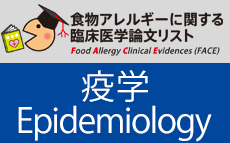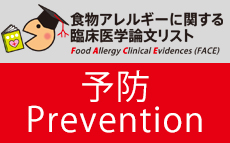Soy formula for prevention of allergy and food intolerance in infants.
更新日:2016年10月21日
| Author: | Osborn DA, Sinn JKH |
|---|---|
| Title: | Soy formula for prevention of allergy and food intolerance in infants. |
| Citation: | Cochrane Database Systematic Review. 2004;(3):CD003741 |
| URL: | https://pubmed.ncbi.nlm.nih.gov/15266499/ |
| Abstract: | BACKGROUND: Allergies and food reactions in infants and children are common and may be associated with foods including adapted cow's milk formulas. Soy based formulas have been used to treat infants with allergy or food intolerance. However, it is unclear whether they can be advocated for the prevention of allergy and food intolerance in infants without clinical evidence of allergy or food intolerance. OBJECTIVES: In infants without clinical evidence of allergy or food intolerance, to determine whether feeding them an adapted soy formula compared to human milk, cow's milk formula or a hydrolysed protein formula prevents allergy or food intolerance. SEARCH STRATEGY: The standard search strategy of the Cochrane Neonatal Review Group was used including searches of the Cochrane Central Register of Controlled Trials (CENTRAL, The Cochrane Library, Issue 4, 2003), MEDLINE (1966 - January 2004), EMBASE (1980 - January 2004), CINAHL (1982 - December 2003) and previous reviews including cross references. SELECTION CRITERIA: Randomised and quasi-randomised trials that compare the use of an adapted soy formula to human milk, an adapted cow's milk or a hydrolysed protein formula for infant feeding in the first 6 months. Only trials with > 80% follow up of participants and reported in group of assignment were eligible for inclusion. DATA COLLECTION AND ANALYSIS: Eligibility of studies for inclusion, methodological quality and data extraction were assessed independently by each reviewer. Primary outcomes included clinical allergy, specific allergies and food intolerance. Meta-analysis was conducted using a fixed effects model where no heterogeneity of treatment effect existed, and a random effects model when heterogeneity was found. MAIN RESULTS: Five eligible studies were found, all enrolling infants at high risk of allergy on the basis of a family history of allergy in a first degree relative. All studies compared use of a soy to a cow's milk formula. Two studies also included a group fed a formula containing hydrolysed protein. No eligible study enrolled infants fed human milk. No study examined the effect of early, short term soy formula feeding. Three studies were of good methodology and did not have unbalanced allergy-preventing co-interventions in the treatment groups. Comparing soy to cow's milk formula, one study with unclear allocation concealment and 19.5% losses to follow up reported a reduction in cumulative incidence of childhood allergy, asthma and allergic rhinitis. No other study reported a significant benefit for any allergy or food intolerance. Analysis found no significant difference in allergy cumulative incidence in infancy (one study: RR 1.02, 95% CI 0.69, 1.49) or childhood (3 studies: typical RR 0.73, 95% CI 0.37, 1.44) and no significant difference in cumulative incidence or period prevalence of any specific allergy or food intolerance in infancy or childhood. Analysis of studies comparing soy to a hydrolysed formula found a significant increase in infant (one study: RR 1.67, 95% CI 1.03, 2.69) and childhood allergy cumulative incidence (one study: RR 1.55, 95% CI 1.02, 2.35), infant eczema cumulative incidence (2 studies: typical RR 2.34, 95% CI 1.51, 3.62) and childhood food allergy period prevalence (one study: RR 1.81, 95% CI 1.09, 3.02). REVIEWERS' CONCLUSIONS: Feeding with a soy formula should not be recommended for the prevention of allergy or food intolerance in infants at high risk of allergy or food intolerance |
| 邦文タイトル: | 準備中 |
| 一般向け要約 | 準備中 |
| 専門医コメント | 準備中 |


